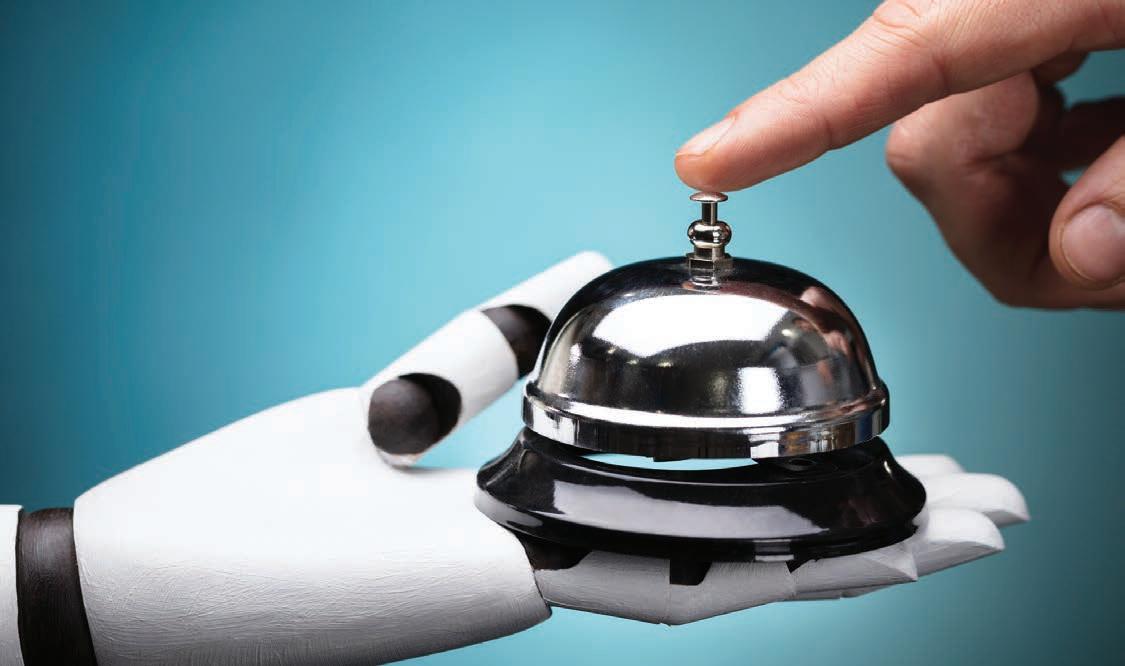
3 minute read
Integrating AI
The key to a competitive advantage for Delaware businesses
BY DAN CARR
ACCORDING TO THE DELAWARE TOURISM OFFICE’S most recent Value of Tourism report, the state saw 28.6 million visitors in 2022—a new record for Delaware. With the tourism industry in the state showing no signs of slowing down, many local businesses are turning to emerging technologies like artificial intelligence (AI) to stay ahead of the curve.
The integration of AI has revolutionized the way businesses across industries operate, particularly in hospitality. It offers competitive advantages and significant improvements in operational efficiency, while playing a crucial role in driving profitability and supporting the workforce. For hospitality, this translates to technological innovations that are reshaping guest experiences and behind-the-scenes operations.
Personalized Guest Experiences
One of the main benefits of AI is the ability to create highly personalized guest experiences. AI-powered customer relationship management (CRM) systems analyze large sets of guest data to predict preferences and behaviors. Delaware hotels can use AI to tailor recommendations—from room preferences to dining options—ensuring guests receive personalized attention. Chatbots and virtual assistants enable hotels to engage with guests 24/7, answering inquiries, making reservations, or providing local recommendations. These systems reduce response times, improve guest satisfaction, and ultimately increase customer loyalty.
Additionally, AI can streamline the check-in process, making it faster and contactless to increase guest convenience while minimizing wait times and improving service quality. At check-out, hotels can offer an automated process via an app, website, or in-room tablet, providing guests the ability to arrange transportation, schedule baggage pickup, review and settle payments, and more at the click of a button.
Operational Efficiency and Cost Reduction
AI has proven invaluable in optimizing back-end operations, a crucial area where Delaware businesses can gain an edge. Predictive analytics can forecast demand based on historical data, helping hotels manage inventory, staffing, and pricing more efficiently. This not only reduces operational costs but also improves resource allocation.
AI-based revenue management systems are transforming how businesses in the industry set prices. Algorithms analyze market trends, competitor pricing, and demand fluctuations to optimize pricing strategies. By offering dynamic pricing, businesses can maximize revenue during high-demand periods while ensuring competitive rates during low-demand times. This boosts profitability and ensures that businesses stay competitive in an increasingly crowded market.
Workforce Enhancement and Augmentation
While AI is often perceived as a tool that replaces human labor, it primarily serves to augment the workforce by handling repetitive, timeconsuming tasks. For example, AI plays a role in staff training and development. AI-driven training modules offer personalized learning experiences based on employee performance, ensuring that staff are trained more efficiently. AI also assists with employee scheduling, creating optimal staff allocation based on real-time data. This minimizes burnout, prevents under- or overstaffing, and improves service quality.
Future-Proofing the Industry
AI integration is not just about solving current challenges; it is also about future-proofing industries. As guest expectations continue to evolve, AI enables hospitality businesses to meet these demands and gain a competitive edge, which is critical in a highly competitive statewide industry. Far from replacing the human element, AI complements it, allowing businesses to deliver superior service while improving operational efficiency. As AI continues to evolve, its role in offering new opportunities for innovation and transforming key industries in Delaware, like hospitality, will only grow.
Dan Carr is the vice president of Comcast Business for the Beltway Region.










